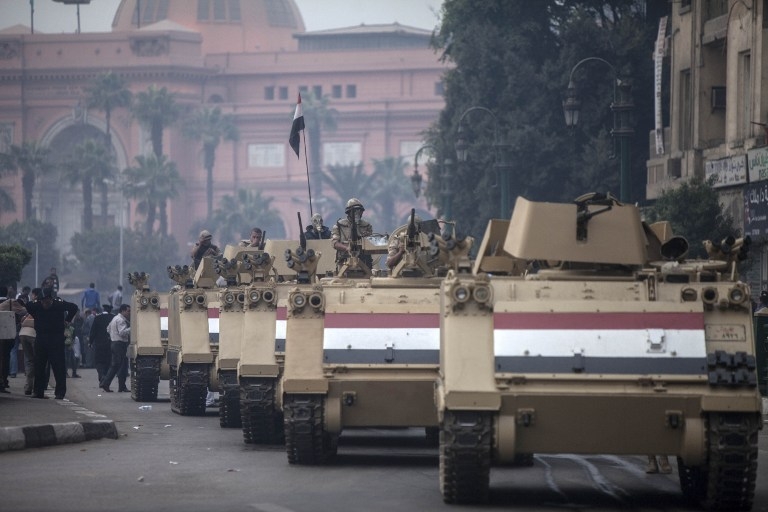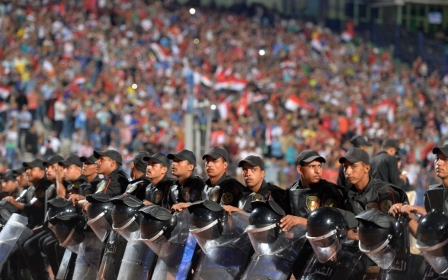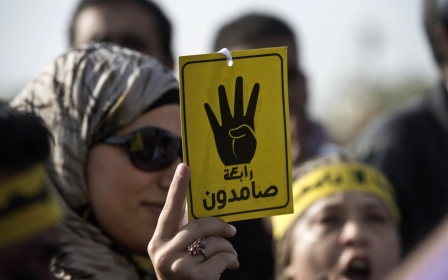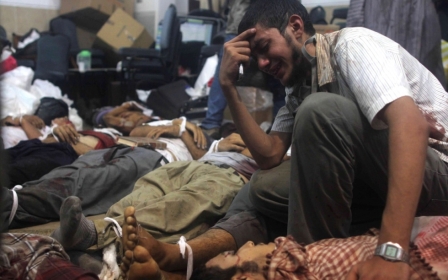Five students referred to Egypt military court

A Cairo criminal court has referred five al-Azhar University students to a military court on charges of protesting at university, a judicial source said on Sunday.
The students were arrested during protests in January and accused of setting fire to part of the engineering faculty at al-Azhar University, Egypt’s Al-Ahram's Arabic news website reported.
The criminal court transferred the students after it ruled the charges - belonging to a "terrorist" group and arson - fell outside its remit, reported the website.
The referral comes after Egypt extended the jurisdiction of military courts through a 27 October decree by President Abdel Fatah al-Sisi allowing for civilians to be tried in military courts.
The law - issued three days after an attack in the Sinai Peninsula killed at least 30 Egyptian security forces - places all “public and vital facilitates” under military jurisdiction for the next two years and directs state prosecutors to refer any crimes at those places to their military counterparts.
Law 136 for the Securing and Protection of Public and Vital Facilities, states that the armed forces “shall offer assistance to the police and fully coordinate with them in securing and protecting public and vital facilities,” or any state-owned property including electricity stations, gas pipelines, oil wells, railroads, road networks and bridges.
Human rights organisations have reacted with dismay at the introduction of the decree, saying the law paves the way for the stifling of political dissent.
“International law does not allow for civilians to be tried by military courts, this is a clear militarisation of the country,” Ahmed Mefreh, legal researcher at the Alkarama Foundation for human rights, told MEE.
“International law does not allow military courts to try civilians no matter how similar civilian and military trials may appear to be,” he added.
According to Mefreh, “the state amended laws related to military court trials to allow for appeals in an attempt to garner public acceptance for the decree.”
Alkarama Foundation also commented in a statement released after the introduction of the presidential decree that the new law is not supported by the Egyptian Constitution and is an attempt to bring back the emergency law.
Egyptians lived under a state of emergency - which gives extra powers to the security services - for more than three decades, until President Hosni Mubarak was forced from power amid mass protests in 2011.
Student activism has long been an incubator for Egypt’s future political actvists. More than 800 students were arrested during demonstrations last year, according to local monitoring groups, while 16 others were killed.
“Although military trials for civilians are considered a crime by international standards, the reality is there is not much of a difference between civilian and military courts. The law is just another attempt by the state to crackdown on dissent,” said Youssof Salhen, spokesperson for Students against the Coup (SAC), a movement across Egyptian universities that protests the military-led government.
Violent clashes between students, security personnel and police forces were reported in October in over 20 Egyptian universities. Hundreds of students were detained while an Alexandria University student died after live ammunition was fired at him at the campus gates.
Another student, Mohamed Ramadan from Ain-Shams University who was detained during university protests last week, reportedly died Sunday night at al-Hadayek police station in Cairo due torture and beatings, according to Salhen.
Human Rights Watch condemned the decree, describing it as an unprecedented expansion of military courts' jurisdiction, which risks the prosecution of protesters and government critics.
“This law represents another nail in the coffin of justice in Egypt,” said Sarah Leah Whitson, Middle East and North Africa director at Human Rights Watch said in a statement dated 17 November. “Its absurdly broad provisions mean that many more civilians who engage in protests can now expect to face trial before uniformed judges subject to the orders of their military superiors.”
“Egypt’s authorities should annul all the military court verdicts against civilians handed down since the new government took power, and President al-Sisi needs to act quickly to amend his decree,” she added.
Military judges have presided over trials of civilians in Egypt for decades, despite efforts by activists and some politicians to eliminate the practise.
Since al-Sisi came to power, military courts have tried at least 140 civilians, according to the Cairo Institute for Human Rights Studies, including three children and four journalists.
The use of military courts to try civilians violates the 1981 African Charter on Human and Peoples’ Rights - which Egypt ratified in 1984 - according to Human Rights Watch. The African human rights commission Principles and Guideline on the Right to a Fair Trial and Legal Assistance forbid military trials of civilians in all circumstances.
New MEE newsletter: Jerusalem Dispatch
Sign up to get the latest insights and analysis on Israel-Palestine, alongside Turkey Unpacked and other MEE newsletters
Middle East Eye delivers independent and unrivalled coverage and analysis of the Middle East, North Africa and beyond. To learn more about republishing this content and the associated fees, please fill out this form. More about MEE can be found here.




